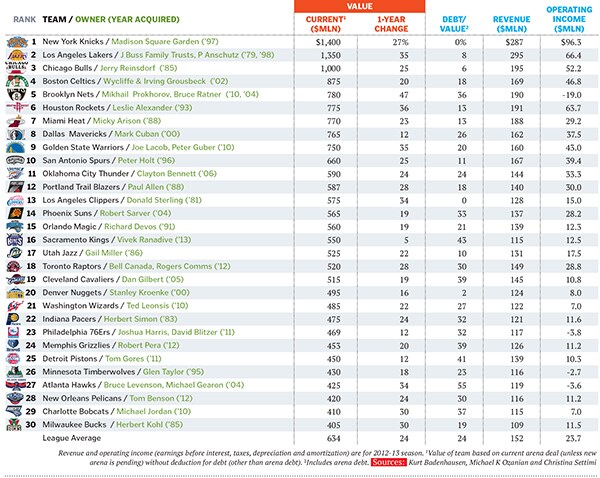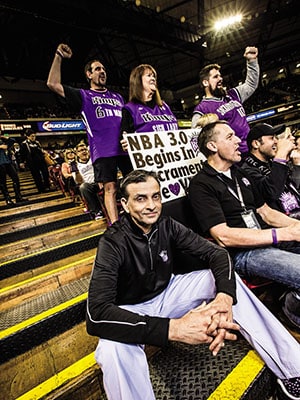
Can An NBA Team Reinvent A City?
We've seen time and again that it can't. But that isn't stopping Big Data pioneer Vivek Ranadivé from using the NBA to bet $1 billion on Sacramento
Vivek Ranadivé is set to sit down in his modest office at the Sacramento Kings’ practice facility, just before his team takes on the Dallas Mavericks. Then he has a better idea. “Let’s go over to the court. My son is in there shooting.”
Settled into a courtside plastic chair in a practice gym across from Sleep Train Arena, watching his 26-year-old son, Andre, fire off jumpers, the Kings’ new owner relaxes, smiles and compels his soft voice above the din of bouncing basketballs. Then he drops this: The billion dollars he and his partners are sinking into Sacramento, he says, will be “one of the best investments in a decade”.
By yourself and your partners, you mean? “No, by anyone.”
Welcome to the through-the-looking-glass world of Vivek Ranadivé. Educated at MIT and Harvard Business School, Ranadivé, 56, made his fortune down the road in Silicon Valley, pioneering real-time information processing for Wall Street (his stake in Tibco, the financial data company he founded, is worth more than $150 million). Later, Ranadivé’s re-imagining of how to play basketball almost turned his 12-year-old daughter’s diminutive team into national champions with a nonstop press that exhausted bigger, better rivals (the David versus Goliath tale was made famous by a 2009 story in the New Yorker). In his first foray into the NBA, the value of his small stake (under 10 percent) in the Golden State Warriors almost doubled in three years as smart arena development exploded the team’s worth from $450 million to $800 million. Ranadivé sold when he bought the Kings.
“It’s not that he likes to think outside the box—he thinks outside the rules,” says Kevin Maney, who co-authored the management tome The Two-Second Advantage with Ranadivé. “To forget everything about the way things have always been done and think about how you’d do it if no rules existed.”
Yet, nothing Ranadivé has ever done is on the scale of what he’s up to now. “We are building the 21st-century city,” he explains, zero doubt or irony in his voice. “It goes back to Rome. Cities are built around their coliseums.” To remake Sacramento, the city will own the new arena, and the Kings’ group will develop the area around it, igniting a downtown renaissance.
Ranadivé’s gamble hinges on the often tried, often failed if-we-build-it-they-will-come model of economic development, this time stealing from San Francisco. Rising Bay Area prices will spur a 90-mile eastward migration creating demand in Sacramento, he says. “The food industry and the health care industry are here, and San Francisco is getting expensive,” he says, sidestepping the notion that Sacramento is not San Francisco. As for the new arena, city financing has yet to be approved. He doesn’t care. “There is no point in going to a place that’s already big,” he says. “The point is to build something here.”
Of course, as any sports economist will tell you, he’ll have to be the second coming of Robert Moses. Sacramento, the state capital, is a particularly long long shot. You won’t find a lot of Silicon Valley money sloshing around here. Unemployment is at 8 percent, and more people are employed in the public sector than any private industry. Office vacancy rates sit at 20 percent. It’s hard to see who will fill Ranadivé’s city of the future.

Still, he has believers—and they’ve opened their wallets. He and his partners, Qualcomm Chief Executive Paul Jacobs, former Facebook executive Chris Kelly, 24-Hour Fitness founder Mark Mastrov and former NBA great Shaquille O’Neal, nabbed a 65 percent stake in the Kings from previous owners Joe and Gavin Maloof for $348 million, a deal that valued the club at a record sale price of $534 million (sources say they borrowed 43 percent, mostly from an NBA credit facility, to buy the team). A subsequent purchase from Bob Cook, a local real estate developer who had declared personal bankruptcy, upped their stake to 72 percent.
They’re also contributing $190 million towards a $448 million downtown arena to open in 2016. And then the kicker: A $500 million investment in a surrounding project that will include a still-undetermined mix of office space, retail stores, condos and restaurants.
The partners’ $1 billion commitment sold the NBA board of governors, who were loath to move another team and turned down a higher bid from Microsoft CEO Steve Ballmer and hedge fund magnate Chris Hansen, who wanted to take the Kings to Seattle.
Also helpful: Ranadivé’s willingness to forgo revenue-sharing money from the league and the backing of Sacramento Mayor Kevin Johnson, a onetime NBA star who—like most politicians— dreaded being ‘The Guy Who Lost Our Team’. Johnson recruited the Ranadivé group and helped broker the arena deal. “It was always an uphill battle. We weren’t supposed to be here,” Johnson says.
Where they are looks a lot like square one, and the financially flailing Kings, who haven’t seen the post-season since 2006, seem an unlikely urban renewal catalyst. Born in Rochester, New York, in 1948, the team trudged through Cincinnati, Kansas City and Omaha before settling in Sacramento in 1985. Following a successful run in the 2000s, things took a big turn for the worse. The Maloofs, plagued by financial trouble, cut back on player payroll, weakening the team and turning off fans. In 2012–13, attendance was last in the league at 13,700 a game. Rumours had the Kings relocating to Virginia Beach or Anaheim. Until Ranadivé showed up.
Since taking control, Ranadivé has plunged into his project with his characteristic faith that he can find unthought-of solutions for the kind of problems that vex others. On the court, new cameras, computers and data promise to reinvent NBA coaching. Off it, his team became the first in the league to start accepting cyber-currency Bitcoin. Applications developed with Qualcomm could give him unprecedented detail about his customers—where they live, what they eat and how much they spend. “It’s like a casino knowing that a blackjack player has just lost three hands in a row and immediately sends a waitress over with a drink,” says Kings President Chris Granger.
As they wait for the new arena deal to be approved, the Kings are making do with smaller initiatives. They’re integrating sponsors with fans, who can now sign up through the team for health care from Kaiser Permanente, the Kings’ official medical provider. Every new season ticket sold this year came with a 10 percent donation to a local charity. And despite an awful start—the Kings were 14–23 through January 16—fans seem buoyed by the new ownership. The team sold nearly 5,000 new season tickets this season, the most in the league. Overall attendance is up to 16,000 a game.
But Ranadivé has a long way to go before he’s fixed his basketball team. The city of the future? We wish him luck with that. He will most certainly need it.
(This story appears in the 30 November, -0001 issue of Forbes India. To visit our Archives, click here.)





